Now for the very good news. Since we now understand that PD is principally a problem with the Nervous System, it is entirely possible that we can pro-actively prevent further degeneration, and even regain what we've already lost, because Vagal Tone can always be improved, neurons regenerated, neural pathways re-written, and senses retrained
Read MoreDopamine and Parkinson's Disease
The Huberman Lab podcast is a lecture series by Prof. Andrew Huberman, professor of neurobiology and ophthalmology at Stanford School of Medicine, on practical and free tools for optimizing health based on the very latest neuroscience and human biology research. This podcast contains vital, actionable, and need-to-know information for people with Parkinson’s Disease, in particular of the latest pragmatic research into dopamine biochemistry. Dopamine is the major neuromodulator which is most problematic in PD, and the target for the mainstay medical interventions. So here I’ve extracted from the podcast episodes the timestamps of everything Prof. Huberman has to teach us on the subject of how to optimize our dopamine biochemistry. The format is the episode title, in order of release, followed by the corresponding timestamp links and descriptions whenever dopamine is referred to.
Read MoreSleep and Parkinson's Disease
In this article, we consider the role of sleep on PD symptoms. I believe that getting good sleep is absolutely foundational, on which all other progressive symptom reduction strategies rest. Indeed, Florencia Cerruti, author of Rebirth at 50: in the end it was not The End, points out that poor sleep, along with stress, is to people with PD like Kryptonite is to Superman. Unfortunately, sleep problems are extremely common with PD.
Read MoreMusic Therapy and Parkinson's Disease
I have played piano since the age of seven and taught music all my life, so it is not surprising that my mobility problems initially became evident to me while playing the piano. I had been asked to demonstrate a new piano, which the local church was considering buying, but while playing I found that I could not move the fingers of my right-hand as quickly as those of my left. For the next eighteen months doctors and physios gave me various diagnoses from trapped nerve to dystonia. When I finally consulted a neurologist, the diagnosis of Parkinson’s was a complete shock.
Read MoreDance Therapy for Parkinson's Disease
Of all the therapies and modalities we’ve discussed here, I believe the most beneficial overall for progressive symptom reduction and movement recovery are Dance based. Here we define Dance Therapy broadly and simply as “moving to music or a beat”
Read MoreThe Divided Brain and Parkinson's Disease, Part 2
In this sequel, we examine more closely the issues that an imbalanced brain function causes, in particular when the left brain is overly dominant, and show that there are strong correlations with the major motor and non-motor symptoms and real lives of people with Parkinson’s Disease. We will also explore links to Dorsal Vagus Nerve mediated immobilization.
Read MoreThe Divided Brain and Parkinson's Disease, Part 1
I have since been considering what Iain McGilchrist’s “Divided Brain” work has to teach us, in the context of trauma and chronic illness, and seeking to employ both hemispheres of my brain in thinking about this. I began to see how Iain’s work provides us with a vital missing part of the puzzle. Indeed, his concept of the "Divided Brain", I now feel, connects so very many of the pieces, and I will endeavour to contexualize and map out my thinking on this here.
Busy, Anxious Thoughts and Parkinson's Disease
Many people with PD (PwP), and caregivers will also be well aware of this, often encounter an almost constant chatter of busy thoughts in their own heads. This inner voice can speak in undertones of self-doubt and guilt, but also can be constantly seeking to blame others, marshalling arguments and self-justifications. These thoughts can go round and round like a tape stuck on a loop, and be very difficult to break out of. Indeed, PwP can become irritable when someone seeks to interrupt these thoughts. These anecdotal experiences have now been backed by science too. A recent article in "Nature",
Read MoreMirroring and Rehearsal Therapies for Parkinson's Disease
Movement in humans is a learned behaviour. We learn to move mainly by watching other people go through the motions: we are not born with any innate ability to move around independently. As babies and toddlers, we spend years watching and mimicking our parents, programming our brains with the data they provide. Our brain knows all about walking before we even attempt to walk ourselves, through unconscious observation. Later, we start to get the hang of it through intensive practice, and especially by falling down and making mistakes. Encouragement and supportive instruction from adults help us to keep practising until we have, at last, developed the ability to move independently. But imagine, if as we started to trying to walk, when we fell over on the second attempt, our parents said "oh dear, walking is not for you"! Unfortunately, this is precisely the message people with PD tend to be given.
Read MoreWalking, Cycling and Dancing: Ankle Mobilization in Parkinson's Disease
In this article, we explore, with the assistance of my friend and mentor, Cheryl Townsley, Health & Wisdom Coach, how the concepts of stress interruption and nervous system resetting help us understand why walking, cycling and dancing - exercises that inherently involve mobilization of the ankle joints - are so beneficial for People with Parkinson's Disease (PwPs), and why we need to keep practicing these regularly.
Read MoreThe Vagus Nerve and Parkinson's Disease
I first discovered the Vagus Nerve (VN) when I was researching how Parkinson's Disease begins in the gut: "Braak's Hypothesis" of the disease states that the problem spreads from its origins in the digestive tract to the brain, using the Vagus Nerve as the conduit. My interest was further piqued when I read that people who had had their VN severed via a vagotomy - a surgical "solution" for stomach ulcers - appeared to have significantly less likelyhood of developing PD.
Read MoreSmovey Rings and Applications For Parkinson's Disease
"Smovey Rings" are a general health and wellness tool that combine exercise and vibration, which have particular beneficial applications for Parkinson's Disease. Indeed, these hand held "rings" were invented by Johann Salzwimmer, an Austrian Tennis player and a person with Parkinson’s, who actually initially designed them specifically to help himself. So it is not hard to understand why these are proving beneficial now with many other people who also have neurological conditions.
Read MoreMusic-As-Medicine for Parkinson's Disease
Like many, people with Parkinson's, I had completely stopped listening to music some time before diagnosis. This "closing off" or withdrawal from the world of the senses is one of the running themes which I have found in talking to very many people with Parkinson's. But whenever I see people with other neurological conditions like Alzheimer's on the TV, invariably they seem to be existing in silence, and have forgotten the music that one made them come to life. Even quite recently, I could not recall seeing people with such conditions, as shown in the reality of their lives, with music even playing in the background, and certainly never saw them with a personal choice of music, carefully chosen to stir all sorts of memories, being played loud directly in their ears via digital headphones. Thankfully, the profound impact of music on people with neurological illnesses, such as Alzheimer's and Parkinson's is now coming to the fore.
Read MoreInsights into Parkinson's Disease
In taking us along with you on your journey you have realised that we are all different yet also all the same. It matters little what kind of music helps us, the fact is that there is some music for each of us that heals our symptoms. For me it's The Shadows music. I discovered this when I was recovering from a mini stroke and the friend came round to play his guitar for me. I could literally feel my brain responding as though I had guitar strings in my head.
Read MoreMoving in the Mind and Parkinson's
Certainly, whether I am correct or not that the mind dancing has significantly contributed to this change, clearly there are health and wellness benefits to the gentle movement therapies I have been developing and espouse. I believe that this kind of muscle growth is unusual in Parkinson's, which is often associated with muscle atrophy.
Read MoreBasket Balls, Music and Reversing Symptoms of Parkinson's
I highly recommend anyone with Parkinson's get a basketball or a netball - the weight and feel matters a lot - and just play, feel, stimulate the muscle memories which are still there. Bounce, balance, catch, throw your way back to moving, every single day. Explore, play, be curious. Practice, but make sure you have fun with it. Enjoy whatever movement you can release, no matter how small. Feel good when you manage to extend your range. Feel good factor = dopamine reward = more movement = more feel good - and that is science fact. In the video I am playing by myself, the therapeutic effects are magnified by the social quotient of playing ball with family members and friends by massive amounts.
Read MoreNeurologic Music Therapy for Parkinson's Recovery
I recommend anyone interested in Parkinson's Recovery to take a look at Jim Kennedy's research and follow his journey of self-experimentation into NMT. You will find Jim to be very positive and upbeat - no doubt because he has chosen to fill his life with music. You can follow Jim's work via his Facebook Page.
Read MoreMovement Recovery with Yo-Yo Stress Balls
Deb had the unique insight that a kind of stress ball (a squeezy, bouncy ball which fit the human hand well) which comes with an attached elastic string and a velcro finger or wrist strap would be hugely beneficial. She based this on our discoveries of how some hand-eye co-ordination movements are relatively easy for people with Parkinsonsim's. She was right!
Read MoreCaregiving for a Person with Parkinson's Disease
Here at Out-Thinking Parkinson's, it is our mission to help not only People with Parkinson's, but also the people who love and care for them, those who also have, in a very direct way, their own lives touched by the disease.
One of the most valuable contributions we can make, we feel, is simply to express the feelings and thoughts of what it is like to be a person affected by Parkinson's or to care for someone with the disease. We hope this humanization of PD will help others in the same situation come to terms with living with the disease and bring new understandings for the wider community too.
Read More















